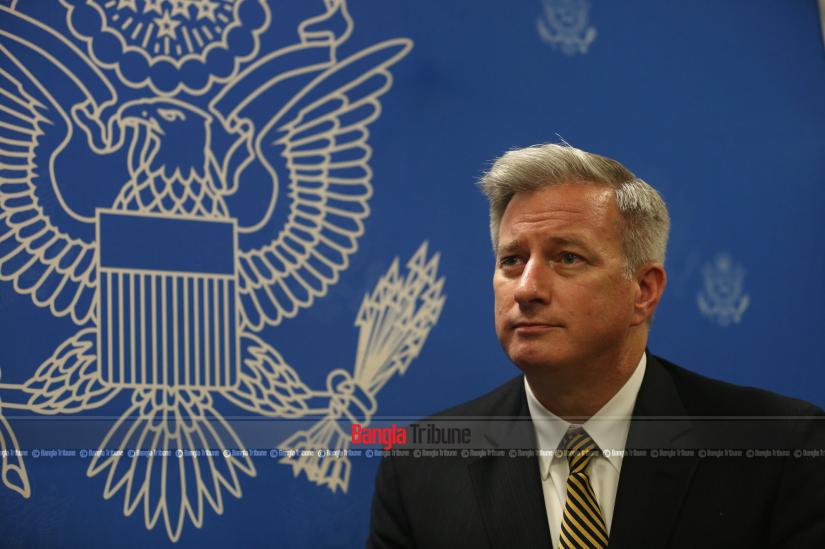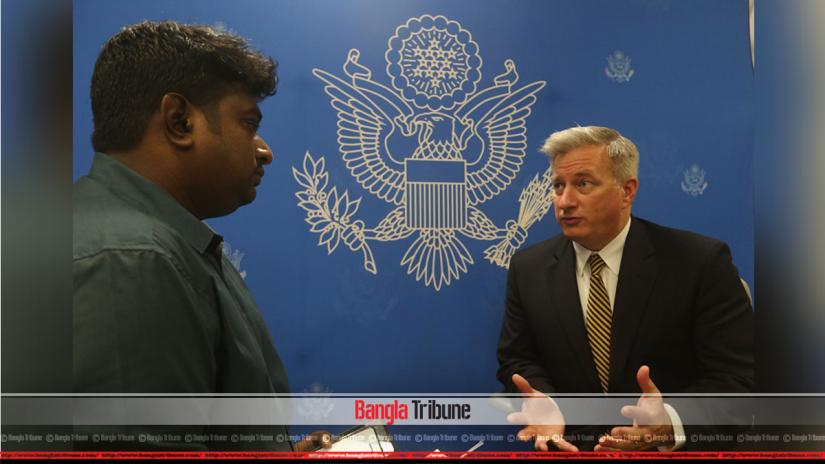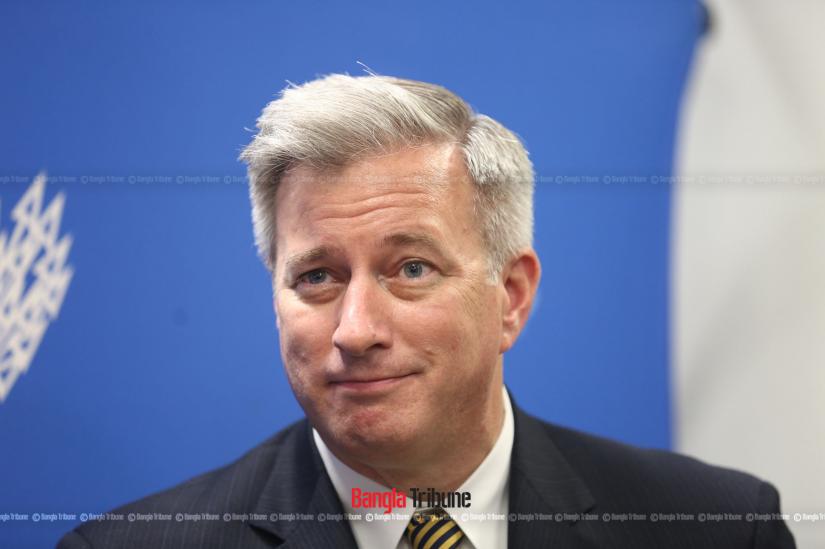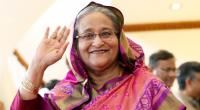 Bangladesh has a strict law called “Human trafficking prevention and suppression act 2012”, but human trafficking is still a major issue.
Bangladesh has a strict law called “Human trafficking prevention and suppression act 2012”, but human trafficking is still a major issue.
In an exclusive interview with Bangla Tribune, US Ambassador-at-Large to Monitor and Combat Trafficking in Persons John Cotton Richmond says that Bangladesh must emphasise on implementation of the law rather than its amendment.
What method does the office to monitor and combat ‘Trafficking in Persons’ follow to collect information for its reports?
John Cotton Richmond: We gather information for the 187 countries that we prepare a narrative for. We start by gathering information through our embassies around the world.
They engage with their interlocutors in the host country government and ask them: what are they seeing in terms of specific questions around prosecution, around protection as well as around prevention.
We gather that information up. We listen to the government, we listen to civil society, we gather media reports and try to make the best assessment we can based on a series of minimum standards that have been outlined for us to measure each country against.
I’ll say that we also measure the United States. Since 2010 we have included a narrative report about the United States making sure that all countries around the world are meeting the minimum standards, or at least trying to in order to combat trafficking in persons.
Why are women and children the main victims of trafficking and what is their eventual fate?
The fate of the trafficking victims around the world really varies depending on how the traffickers are choosing to mistreat them. Traffickers are using folks in forced labour as well as sex trafficking through using different types of coercion schemes to compel people to engage in work or engage in commercial sex acts.
Some of those schemes are quite violent; sometimes they harm them [the victims] physically but other times they use non-violent coercion. They use threats, they use intimidation; they use the opportunity to manipulate them through fear and shame, debt manipulation, identity documents.
This really was a revolution in 2000 when we saw the world shift away from thinking about only violent coercion or force and embrace the idea of non violent coercion. And they did that in the United Nations Palermo Protocol; the protocol to combat trafficking in persons. The United States did it in 2000 when it passed its trafficking victims protection act. Bangladesh embraced the exact same methodology in 2012 when it passed its trafficking in persons law.
A large number of Bangladeshi female workers go to the Middle East to work and often, they come back in a short time, citing torture and abuse as the reason to leave work. Are these women victims of trafficking?
They certainly can be. Part of human trafficking is forced labour. Wherever, labour is compelled, wherever a person is not free to quit their job and work somewhere else where they want. Wherever someone is not choosing to work but is forced to work. That is human trafficking.
So it’s not trafficking in the name of forced labour, it is forced labour that is human trafficking. If this is happening abroad or any other country we want to make sure that country is arresting and prosecuting the individuals that are forcing that person to work.
If the victim has already come back to Bangladesh we want to make sure that they get robust, comprehensive trauma-informed services.
In the US State Department’s ‘Trafficking in Person’ report, why has Bangladesh’s position remained unchanged for the last three years?
The Tier 2 Watch list is one of the four rankings that we have for a country. It’s because the minimum standards have not been met there.
We have seen decrease in the number of victims identified, a decrease in the number of investigations, a decrease in the number of convictions and a decrease in the number of services provide to victims. These patterns should change.
We want to come alongside our friends in Bangladesh, want to partner together in order to make sure that we see a reversal of that.
I will say that this is consistent with the global trend, we’ve seen drop in prosecution globally including in the United States and we want to make sure we reverse that as well.
As I learn about your profile that you have trained many judges and prosecutors. As a trainer, what do you think the conviction level of Bangladesh is better than other countries or worse?
We don’t compare countries to each other. We just compare country’s efforts against its prior efforts in the previous reporting cycle. So it’s not about Bangladesh being better or worse than another country. It is, if Bangladesh is meeting up to its own standards. Is it continuing to have increasing efforts to stop trafficking? That’s the measure used in the ‘Trafficking in Persons’ report.
I’ve seen that ‘TIP’ has given a waiver to Bangladesh. It was supposed to be on Tier 3 but they have given the waiver to Tier 2 watch list. Why is that?
The waiver allows the country to stay on the Tier 2 watch list beyond two years so we were glad to see that the secretary of the state granted that waiver and allowed Bangladesh to stay on the watch list again for this year.  What will happen if Bangladesh remains on the same position in 2020?
What will happen if Bangladesh remains on the same position in 2020?
Well, at this point a maximum number of years a country can stay on the Tier 2 watch list is three years. So next year, if Bangladesh is unable to elevate to Tier 2, then it will be placed in Tier 3.
Will swift disposal of human trafficking case play a constructive role in improving the scenario in Bangladesh?
I like how you phrased that; a swift disposal of human trafficking cases. We want to do a couple of things. We want to move criminal cases through the system as quickly as possible in a way that honours the victims.
We want to dispose of the cases but we don’t want to dispose of the victims. We want to make sure that there we’re honouring them and we’re giving them the services that they need. And we want to do that throughout the investigative process.
So while we are investigating cases we want to make sure that the victims are getting stabilising care. While we are prosecuting the perpetrators, we want to make sure that they are treated with dignity during the court process and hopefully after the perpetrators are convicted, we are still seeing care provided to the survivors.
We have a recommendation in the TIP report regarding the Rohingyas to have free movement and access to livelihood and education. How does it impact trafficking in the camps?
What we worry about is vulnerability. The more vulnerable someone is, the more likely a trafficker might want to traffic them. That is traffickers want to use the least amount of coercion necessary to compel someone to work. So if they can find someone more vulnerable, it just takes less effort on the part of the traffickers to commit the crime.
So where the Rohingya might be vulnerable, we know the traffickers might want to target them. And so we want to partner with the Bangladeshi government to limit those vulnerabilities as much as possible.
If they are allowed out of the camps will they be more vulnerable?
I’ll leave it to experts in refugee management and refugee issues to figure out about whether people should come out from the camps or not. But I will say this. Where traffickers are exploiting Rohingya, I think we want to make sure that we stop them.
Do you think Bangladesh should make amendments in the Prevention and Suppression of Human Trafficking Act of 2012? How can Bangladesh implement this law better?
I probably have a different opinion on this than more people. In general when it comes to amending laws, I’m less interested in spending all the energy necessary for a parliament or for a congress to change the law and I’m a lot more interested in people just implementing the law as it is.
Not to say there are not ways to improve this; there are ways to improve every law. But I don’t think that the people that are being exploited right now by traffickers are desperate for an amendment to the law.
I think what they’re desperate for is for the law to be enforced equitably. They just want to make sure that their pain stops. We want to make sure that we take the laws in existence as they are, perhaps even flawed as they are and apply them equitably across the board.
The International Labour Organisation (ILO) recently came out with data showing that the majority of victims of trafficking around the world are exploited internally, without ever crossing a border. What can you tell us about internal trafficking in Bangladesh? How can the government combat internal trafficking?
The number one way to combat is to look for it. The number one way to combat it is to believe that it’s there and to go find it. It forms in many ways. There are certainly sex trafficking of children, there are sex trafficking of adults by coercion, there are forced labour that’s hosted in different industries. I think what we have to prioritise the proactive investigation into these cases. That we can go out and look for incidents of trafficking and make sure that where we find them, we do something about them. How can the USA support Bangladesh to better address human trafficking?
How can the USA support Bangladesh to better address human trafficking?
We want to stand with our friends in Bangladesh. We want to work together and collaborate on ways to stop traffickers. We can do that in a number of different ways. We can do it through our partnerships, we do it through our embassy here in the capital, we have got several programs that are established in terms of assisting prosecutors and law enforcement. We want to make sure we continue to support all the efforts for the Bangladeshi government in caring for the Rohingya community. We’re going to keep doing everything we can.
Does it include our law enforcements and common officials to be trained up about these things?
Certainly there is training involved but beyond training there has to actually be action. What we have to have is not more trainings and seminars or three more day conferences. There not bad in themselves but they’re not going to make differences.
What we really need to do is see that the people put the training they’ve already received into action.
Richmond co-wrote the first Federal Human Trafficking Report which analyses human trafficking trends and data. Ambassador Richmond also worked for more than ten years as a federal prosecutor for the US justice department’s Human Trafficking Prosecution Unit.
 National
National
30762 hour(s) 42 minute(s) ago ;
Afternoon 01:36 ; Saturday ; Apr 20, 2024
‘Human trafficking laws need implementation rather than amendments’
Send
Saddif Ovee
Published : 01:00, Aug 08, 2019 | Updated : 12:10, Aug 10, 2019
Published : 01:00, Aug 08, 2019 | Updated : 12:10, Aug 10, 2019
0 ...0 ...
/tf/st/zmi/
Topics: Top StoriesExclusive
- KOICA donates medical supplies to BSMMU
- 5 more flights to take back British nationals to London
- Covid19: Rajarbagh, Mohammadpur worst affected
- Momen joins UN solidarity song over COVID-19 combat
- Covid-19: OIC to hold special meeting
- WFP begins food distribution in Cox’s Bazar
- WFP begins food distribution in Cox’s Bazar
- 290 return home to Australia
- Third charter flight for US citizens to return home
- Dhaka proposes to postpone D8 Summit
Unauthorized use of news, image, information, etc published by Bangla Tribune is punishable by copyright law. Appropriate legal steps will be taken by the management against any person or body that infringes those laws.
Bangla Tribune is one of the most revered online newspapers in Bangladesh, due to its reputation of neutral coverage and incisive analysis.
F R Tower, 8/C Panthapath, Shukrabad, Dhaka-1207 | Phone: 58151324; 58151326, Fax: 58151329 | Mob: 01730794527, 01730794528


